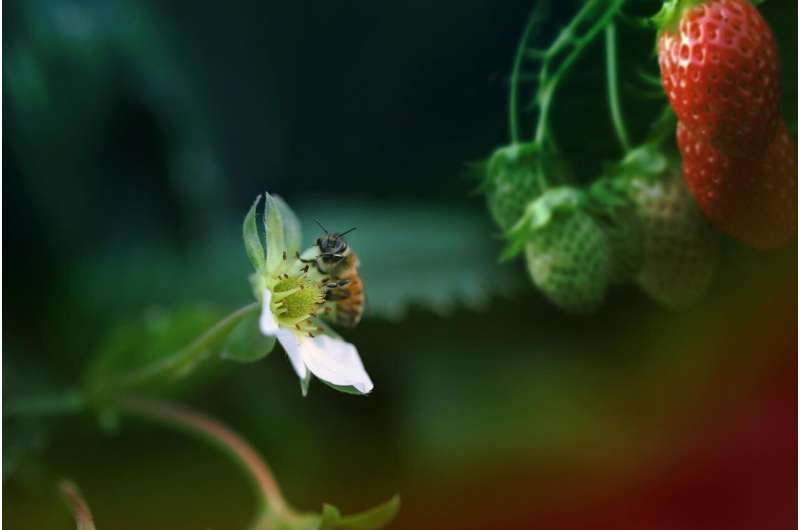Strawberries are smaller when bees ingest pesticides, study finds

Solitary bees that ingested the pesticide clothianidin when foraging from rapeseed flowers became slower. In addition, the strawberries pollinated by these bees were smaller. This is shown by a new study from Lund University in Sweden.
Strawberries are known to become bigger if bees have visited their flowers, but how strawberry growth is affected if the bees have been exposed to neonicotinoid insecticides has so far been unclear. In a new study published in PLOS ONE, a Swedish research team has made two discoveries.
"We studied bees that ingested clothianidin, a pesticide that was previously used in rapeseed to control flea beetles. Our study indicates that the substance made the bees slower and impaired their ability to pollinate the strawberry flowers," says Lina Herbertsson, biology researcher at Lund University.
The researchers used 12 outdoor cages where solitary bees could forage from rapeseed and strawberry flowers. In half of the cages, the rapeseed had been treated with clothianidin. The bees that were exposed to the treated rapeseed needed more time than other bees to visit the same number of rapeseed flowers. When the researchers later weighed the strawberries, they made another discovery. It turned out that the strawberries were smaller if they had been pollinated by bees that foraged from clothianidin-treated rapeseed.
"Previous studies have shown that clothianidin affects wild bees negatively in terms of foraging speed, development and reproduction. Our results indicate that it can also impair the bees' ability to pollinate strawberry flowers," says Lina Herbertsson.
She emphasizes the importance of interpreting the results with some caution.
"In our study, we did not identify the cause for the lower strawberry weight, and after only having performed a single study under rather special circumstances, we also don't know if this is a general pattern," Lina Herbertsson says.
In 2018, the EU decided to completely ban the use of clothianidin and two other neonicotinoids for outdoor plant protection. One of the other neonicotinoids was thiamethoxam, which can distort apple pollination by bumblebees, as previously shown by another research team. Even though these agents are no longer used for outdoor plant protection in European agriculture, Lina Herbertsson believes that the new results are important because they show that pesticides can have more complex effects than usually expected.
"Although clothianidin is now banned, other substances that affect the nervous system of insects in a similar way have partly replaced it. It is therefore of the utmost importance to continue this research and investigate how these substances affect bee behavior and pollination," Lina Herbertsson concludes.
More information: Lina Herbertsson et al, Seed-coating of rapeseed (Brassica napus) with the neonicotinoid clothianidin affects behaviour of red mason bees (Osmia bicornis) and pollination of strawberry flowers (Fragaria × ananassa), PLOS ONE (2022). DOI: 10.1371/journal.pone.0273851
Journal information: PLoS ONE
Provided by Lund University





















